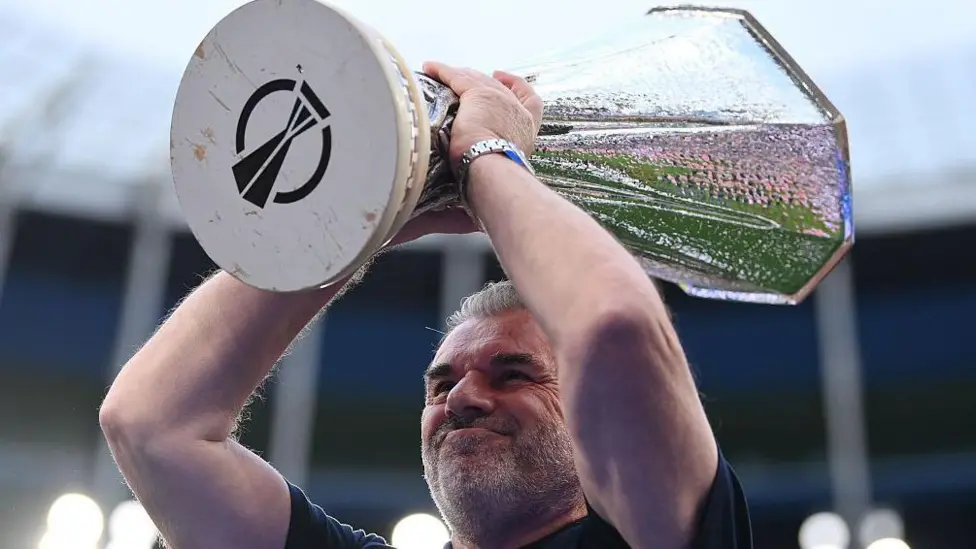Tottenham Hotspur’s decision to part ways with manager Ange Postecoglou has sparked widespread debate, especially considering the major triumph he brought the club in only his second season. A 1-0 victory over Manchester United in Bilbao secured Spurs their first major trophy in 17 years, marking the culmination of Postecoglou’s relentless drive to bring success to the club. However, this significant achievement has been overshadowed by Tottenham’s disappointing Premier League campaign, which saw them finish a lowly 17th after losing 22 of their 38 matches. The timing of his departure, just two years after he joined the club, has left fans and pundits alike questioning the club’s decision to sack a manager who delivered silverware.
Postecoglou’s tenure at Tottenham started with high hopes. Upon joining from Celtic on a four-year contract, there was immediate enthusiasm about his potential to revitalize the club’s fortunes. In his first season, he managed to lead Spurs to a respectable fifth-place finish, a far cry from the previous years of instability under various managers. The club, which had struggled under the likes of Jose Mourinho, Nuno Espirito Santo, and Antonio Conte, was in need of a manager who could provide stability and inject some attacking flair. Postecoglou was the man tasked with this job, and he delivered on his promise, transforming Tottenham into a more vibrant, attacking side.
The early part of the 2023-24 Premier League season was a testament to Postecoglou’s methods. Despite losing club legend Harry Kane to Bayern Munich, Spurs adapted well to life without their all-time top scorer. The team played exciting, free-flowing football that won over fans and led to Postecoglou winning three consecutive Manager of the Month awards. By the end of the season, Tottenham had amassed 26 points from their first 10 games, setting the tone for a competitive campaign. However, as the season wore on, the cracks began to show. Five defeats in their final seven matches meant Spurs missed out on Champions League qualification, and things did not improve in the 2024-25 season.
Despite winning the European trophy, the domestic struggles were undeniable. Spurs’ form in the Premier League had slipped significantly, and Postecoglou’s tactics were increasingly scrutinized. Injuries to key players, combined with a defense that conceded goals far too easily, exposed weaknesses in the team’s overall structure. While the attacking style Postecoglou instilled was attractive at times, it often left the team vulnerable defensively. Tottenham’s poor record of 78 points from 66 games since November 2023 was the 16th-best in the league, and their 64 goals scored, while respectable, were negated by the 65 goals conceded.
The decision to sack Postecoglou was made after a “review of performances” by the club’s hierarchy. Despite his success in Europe, the club’s management felt a change was necessary to improve their standing in the domestic league. In a statement, Tottenham acknowledged that Postecoglou had delivered “one of the club’s greatest moments” by winning a European trophy but felt that a shift in approach was required for the future. Spurs’ management cited the need for competitiveness in multiple competitions and emphasized that the decision was not made lightly. While some might view Postecoglou’s sacking as harsh, especially given the major success he achieved in his second season, it reflects the unforgiving nature of modern football where results in the league often take precedence over cup success.
Tottenham’s statement after Postecoglou’s departure expressed gratitude for his efforts and highlighted the foundations he had laid for the club. Postecoglou, for his part, expressed pride in his time at Spurs and reflected on the hard work that had gone into bringing the club a major trophy. He also spoke of his belief in the potential of the players he had worked with, referring to them as “legends of the football club.” His departure marks the end of a chapter that promised much but ultimately faltered in the league.
The aftermath of Postecoglou’s departure has led to intense speculation about who will replace him. Brentford’s Thomas Frank is one of the leading candidates, with Bournemouth’s Andoni Iraola, Fulham’s Marco Silva, Crystal Palace’s Oliver Glasner, and former Spurs manager Mauricio Pochettino also in the frame. Pochettino’s potential return is of particular interest, given the success he enjoyed at the club before his sacking in 2019. However, with Pochettino now managing in the United States, it remains to be seen whether he will be willing to return to north London.
The sacking of Postecoglou has divided opinion among Tottenham supporters. Some feel the decision is justified, pointing to the club’s struggles in the league and the need for a fresh approach. Others, however, argue that the manager should have been given more time, especially after delivering the club’s first major trophy in nearly two decades. Spurs defender Pedro Porro expressed his appreciation for Postecoglou’s leadership, thanking him for guiding the team through both good and bad times. The forward Richarlison also praised Postecoglou’s ability to deliver silverware in his second season, noting that his legacy at Spurs would always be celebrated for that achievement.
Despite the internal turmoil, Postecoglou’s reign will be remembered for its positive aspects. His commitment to an attacking style of play and his belief in the potential of his players were defining features of his time at the club. The European triumph, although overshadowed by the team’s league struggles, remains a significant moment in Tottenham’s history. It marked a rare moment of success in a period that has otherwise been filled with disappointment and managerial turnover.
As Tottenham moves forward, the club faces a crucial decision in appointing a successor to Postecoglou. The next manager will inherit a squad that has shown glimpses of brilliance but has failed to find consistency in the league. With a major trophy now in the club’s cabinet, the new manager will be tasked with building on that success while also ensuring the team performs at a high level in the Premier League. The pressure to succeed domestically will be immense, and the club will need to find a manager who can strike the right balance between attacking football and defensive solidity.
In the end, Postecoglou’s time at Spurs will be remembered as a period of transition. While the club’s trophy drought was finally ended under his guidance, his inability to deliver sustained league success ultimately cost him his job. The club’s hierarchy will hope that the next managerial appointment will bring both domestic and European success, ensuring that Tottenham’s legacy is further cemented in English football.
The nature of football, with its ever-changing landscape, means that decisions like these are often made in the pursuit of greater success. Spurs’ ambitions remain high, and they will be hoping that the next manager can build on the foundation laid by Postecoglou. Whether that happens will depend on the club’s ability to identify the right leader who can navigate the challenges ahead and restore Tottenham to its rightful place among the Premier League’s elite.




